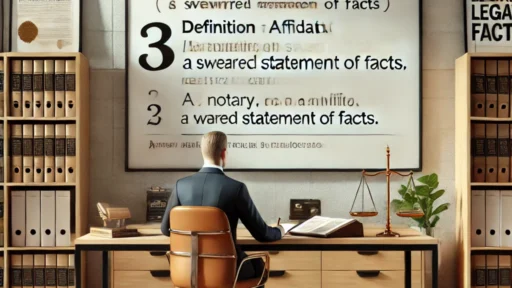A sworn affidavit serves as a powerful legal document that can significantly impact various situations, from court cases to personal declarations. It’s a written statement confirmed by oath or affirmation, ensuring that the information presented is both truthful and reliable. Understanding how to craft a sworn affidavit can be essential for anyone navigating legal processes or formal agreements.
In this article, readers will explore a clear example of a sworn affidavit, highlighting its structure and key components. By examining this example, individuals can gain valuable insights into how to effectively articulate their statements and ensure they meet legal standards. Whether for personal or professional use, mastering the art of writing a sworn affidavit can bolster credibility and support one’s case.
What Is a Sworn Affidavit?
A sworn affidavit is a formal written statement confirmed by oath, serving as evidence in legal matters. This document holds significant weight in various legal processes, making its proper understanding and creation essential.
Definition and Purpose
A sworn affidavit constitutes a voluntary declaration of facts, addressing a specific issue. It functions to document statements that a person affirms to be true, under penalty of perjury. Sworn affidavits commonly appear in court proceedings, administrative hearings, and other legal contexts. The purpose of a sworn affidavit is to provide clarity and support for claims, requests, or applications.
Legal Significance
Sworn affidavits carry considerable legal significance due to their use as credible evidence. Courts accept them as reliable documents, presenting personal statements that individuals can use to substantiate claims or defenses. In many cases, the presence of a sworn affidavit can influence legal outcomes, making it a vital tool in legal proceedings. The sworn affidavit’s signed statement affirms the truthfulness of the content, thereby enhancing its legal authority.
Key Elements of a Sworn Affidavit
A sworn affidavit comprises several key elements essential for its validity and effectiveness. Understanding these components ensures the affidavit serves its intended legal purpose.
Identification of the Affiant
Identification of the affiant includes the full name, address, and, in some cases, the occupation of the individual making the affidavit. This information establishes the identity of the person providing the sworn statement. Additionally, including identification helps to verify that the affiant is a credible source.
Statement of Facts
Statement of facts presents a clear and factual account of the circumstances relevant to the affidavit. Each fact should be stated in numbered or bulleted form to enhance clarity. Facts must be objective, specific, and detailed, ensuring that the affiant’s narrative is coherent and understandable. This section should avoid opinions or assumptions, focusing solely on verifiable information.
Oath or Affirmation
Oath or affirmation is a critical component where the affiant declares, under penalty of perjury, that the information provided is truthful. This statement signifies the legal commitment of the affiant to the accuracy of their claims. The language must clearly denote the seriousness of the affidavit, often concluding with phrases like “I swear” or “I affirm” followed by the date and signature of the affiant, along with the signature of a notary public or official witness.
Sworn Affidavit Example
A sworn affidavit must follow a specific format to be effective and legally accepted. The example below illustrates its structure and essential components.
Sample Format
- Title: Include “Affidavit” prominently at the top of the document.
- Affiant’s Information: Provide the affiant’s full name, address, and occupation.
- Statement of Facts: Present a clear, numbered list of facts. Each fact should be concise and relevant, formatted as follows:
- Fact 1: Describe the event or situation.
- Fact 2: Include dates, locations, and other specifics.
- Fact 3: State the significance or impact of the facts presented.
- Oath or Affirmation: Conclude with a declaration, such as “I affirm under penalty of perjury that the foregoing is true and correct.”
- Signature Line: Include a line for the affiant’s signature and the date of signing.
- Notary Section: Space for a notary public’s signature, seal, and date, confirming the affidavit’s validity.
- Court Proceedings: Sworn affidavits serve as credible evidence in litigation.
- Real Estate Transactions: They are often required to verify ownership or title issues.
- Family Law: In divorce or custody cases, they help establish pertinent facts.
- Financial Applications: Lenders may request sworn affidavits to ensure accuracy in loan commitments.
- Affirmation of Identity: Individuals often use them to confirm identity or residency for legal documents.
Tips for Writing a Sworn Affidavit
Writing a sworn affidavit requires attention to detail and adherence to legal standards. These tips help ensure the document’s effectiveness and reliability.
Ensuring Clarity and Precision
- Use straightforward language: Utilize simple terms and phrases. Avoid jargon to improve reader comprehension.
- Structure the content: Organize facts chronologically or thematically. Use bullet points or numbered lists to highlight key information.
- Be specific: Provide precise details, including dates, locations, and names. Specificity enhances the affidavit’s credibility.
- Limit extraneous information: Focus on facts relevant to the case. Eliminate personal opinions or unnecessary anecdotes.
- Proofread the document: Review the affidavit for spelling and grammatical errors. A polished document reflects professionalism.
- Understand jurisdiction requirements: Different jurisdictions have specific rules regarding sworn affidavits. Research these requirements to ensure compliance.
- Include a notary acknowledgment: Most affidavits require notarization. Include a notary section to validate the signing process.
- Use appropriate format: Follow standard formatting conventions for affidavits. Consistency supports legal acceptance.
- Stay truthful: Provide accurate information only. False statements may result in legal penalties for perjury.
- Consult legal counsel, if necessary: Seek guidance from a legal professional to confirm the affidavit meets specific legal standards or requirements.
Discover the Power of BlueNotary:
Integrate your Business, Title Company, or Law Firm to Satisfy your Customers and Decrease Turnaround
Get a document Notarized/Sign-up
Join the Free Notary Training Facebook Group
Conclusion
Crafting a sworn affidavit is a vital skill that can significantly impact legal proceedings. By understanding its components and adhering to best practices, individuals can create documents that stand up in court and effectively convey their statements.
The importance of clarity and truthfulness in these affidavits cannot be overstated. With the right approach, anyone can produce a credible sworn affidavit that meets legal standards. This knowledge empowers individuals in various legal situations, ensuring their voices are heard and their claims are validated.
Frequently Asked Questions
What is a sworn affidavit?
A sworn affidavit is a formal written statement in which a person affirms that the information provided is true, confirmed by their oath. It serves as credible evidence in legal matters and is used in various contexts, including court proceedings and real estate transactions.
Why are sworn affidavits important?
Sworn affidavits are crucial because they provide reliable evidence that can influence legal outcomes. Courts accept them as credible, making them an important tool for documenting facts and supporting legal claims.
What are the key components of a sworn affidavit?
The key components of a sworn affidavit include the affiant’s identification (name, address), a clear statement of facts organized logically, an oath or affirmation of truthfulness, and signatures from both the affiant and a notary public or official witness.
How do I write an effective sworn affidavit?
To write an effective sworn affidavit, use clear and straightforward language, organize content logically, be specific about details, and avoid extraneous information. Proofread it for accuracy and ensure it meets your jurisdiction’s requirements.
Do I need a notary for a sworn affidavit?
Yes, a sworn affidavit typically requires a notary public or an official witness to validate the document. The notary’s acknowledgment is essential for the affidavit’s legal standing and credibility in court.








